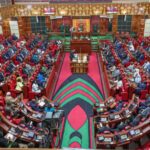 A proposed law by the National Treasury is raising alarms across the gig economy, as freelancers, digital creators, musicians, taxi drivers, and other self-employed individuals brace for major tax and employment changes.
A proposed law by the National Treasury is raising alarms across the gig economy, as freelancers, digital creators, musicians, taxi drivers, and other self-employed individuals brace for major tax and employment changes.
The Business Laws (Amendment) Bill 2024, recently tabled in Parliament, aims to expand the tax net by formally recognizing gig workers as employees. If enacted, the Bill would overhaul how Kenya classifies and taxes self-employed individuals, potentially impacting millions.
Under the proposal, the definition of an “employee” would broaden to include anyone earning wages—whether they work remotely, on-site, or even for a short period.
“Employee means a person who is employed for wages or a salary and includes an apprentice, indentured learner, and a person who performs his duties remotely or on-site within a business process outsourcing arrangement or an information technology-enabled service,” the Bill states.
This change would make gig workers, including ride-hailing drivers, content creators, online freelancers, and tech contractors, subject to statutory deductions similar to those salaried workers face.
The Treasury insists the amendment will help “create a conducive environment for doing business.” However, many fear it may do the opposite by placing additional financial and administrative burdens on both freelancers and the companies that hire them.
The Bill also requires employers to provide gig workers with the necessary tools, equipment, and statutory benefits—even for short-term engagements.
“The employer shall ensure that an employee working remotely or on the employer’s site is provided with the necessary tools, equipment, and resources to effectively perform his duties,” it reads.
Moreover, the proposed legislation redefines a “self-employed person” as anyone earning income outside a formal employment contract, regardless of whether they employ others. This would bring informal sector earners—like musicians, boda boda riders, and construction workers—under new tax obligations.
The move aligns with Treasury Cabinet Secretary John Mbadi’s recent push to expand the country’s tax base. Speaking in Parliament last month, Mbadi ruled out increasing direct income taxes, warning that doing so would shrink consumer spending and slow economic growth.
“We cannot continue increasing rates on direct income, employment income, or other direct taxes,” he told lawmakers. “Direct taxes have the potential of reducing disposable income, which again reduces demand for goods and services—ultimately affecting production and employment.”
Mbadi emphasized the importance of tapping into overlooked income streams without burdening already-taxed citizens.
“There are many Kenyans out there who are very capable of paying taxes, but because they are not visible, they are not paying,” he added.








